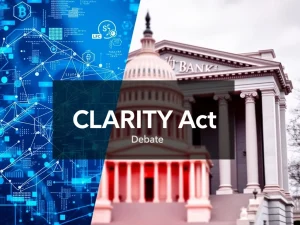Revolutionary Vision: Wyoming Explores Blockchain Treasury for Unprecedented Transparency

Imagine a state treasury operating with the efficiency and transparency of blockchain technology. This isn’t just a futuristic fantasy; it’s a tangible possibility Wyoming is seriously exploring. Anthony Apollo, the executive director of the Wyoming Stable Token Commission, recently championed the idea of transitioning the state’s treasury operations onto a blockchain. Why is this such a game-changer, and what could it mean for the future of government finance? Let’s dive into this exciting development and unpack the potential of a blockchain treasury.
Why a Blockchain Treasury? Embracing a Revolutionary Ecosystem
Apollo argues that a blockchain treasury offers an ecosystem that is “exponentially better” than the current system. But what makes it so superior? The core advantages lie in the inherent nature of blockchain technology itself:
- Real-Time Transparency: Every transaction on a blockchain is recorded and auditable in real-time. This means public funds would be trackable from their origin to their destination, fostering unprecedented transparency and accountability in government spending. Imagine citizens being able to see exactly where their tax dollars are going, reducing opacity and increasing trust.
- Enhanced Security: Blockchain’s decentralized and cryptographic nature makes it incredibly secure. Transactions are tamper-proof and resistant to fraud, significantly reducing the risk of financial mismanagement and corruption within the Wyoming blockchain treasury system.
- Increased Efficiency: Automated processes through smart contracts can streamline treasury operations, reducing paperwork, manual errors, and bureaucratic delays. This can lead to faster payments, quicker reconciliations, and overall improved efficiency in managing public funds.
- Reduced Costs: While initial setup costs might be involved, in the long run, a blockchain treasury could potentially reduce operational costs. Automation, reduced fraud, and streamlined processes can lead to significant savings for the state.
- Traceability and Auditability: The immutable ledger of a blockchain provides a complete and verifiable audit trail for all financial transactions. This makes auditing simpler, faster, and more reliable, further enhancing accountability and deterring financial irregularities in the government blockchain system.
Wyoming’s Bold Step into Digital Finance: Leading the Charge
Wyoming has consistently positioned itself as a crypto-friendly state, enacting legislation to attract blockchain businesses and innovation. Exploring a blockchain treasury is a natural extension of this progressive stance. By potentially becoming the first state to adopt such a system, Wyoming could solidify its reputation as a leader in digital finance and blockchain technology adoption within government.
This move isn’t just about technological advancement; it’s about fundamentally rethinking how state finances are managed. It’s about building a more trustworthy, efficient, and accountable system for the people of Wyoming. The state is already home to numerous blockchain companies and experts, providing a fertile ground for developing and implementing such an ambitious project.
Stable Token Commission’s Vision: Paving the Way for Blockchain Adoption
The Wyoming Stable Token Commission, under the leadership of Anthony Apollo, plays a crucial role in exploring and promoting blockchain initiatives within the state. Their advocacy for a blockchain treasury highlights the commission’s commitment to leveraging innovative technologies to improve governance and public services. The commission’s work is instrumental in:
- Research and Development: Investigating the feasibility and practicalities of implementing a blockchain treasury system.
- Policy Recommendations: Advising state lawmakers on the necessary legal and regulatory frameworks to support blockchain adoption in government.
- Education and Outreach: Raising awareness among government officials and the public about the benefits of blockchain technology and its applications in public finance.
- Pilot Programs: Potentially initiating pilot projects to test and refine blockchain solutions for specific treasury functions before full-scale implementation.
Challenges and Considerations: Navigating the Path to a Blockchain Treasury
While the potential benefits of a blockchain treasury are significant, it’s important to acknowledge the challenges and considerations that need to be addressed:
| Challenge | Consideration |
|---|---|
| Scalability: | Can the chosen blockchain network handle the volume of transactions associated with a state treasury? Scalability solutions and careful network selection are crucial. |
| Interoperability: | How will the blockchain treasury system integrate with existing state financial systems and other government agencies? Seamless interoperability is essential for smooth operations. |
| Regulatory Compliance: | Ensuring the system complies with all relevant state and federal regulations, particularly regarding data privacy and financial oversight. |
| Cybersecurity: | While blockchain is secure, robust cybersecurity measures are still necessary to protect the system from potential vulnerabilities and attacks. |
| Public Education and Adoption: | Educating government officials and the public about the new system and ensuring smooth adoption and understanding. |
The Future of Government Finance: Is Blockchain the Answer?
Wyoming’s exploration of a blockchain treasury is a powerful example of how blockchain technology can move beyond cryptocurrencies and revolutionize various sectors, including government and public administration. If successful, this initiative could serve as a blueprint for other states and even national governments looking to modernize their financial systems and enhance transparency.
The move towards a government blockchain for treasury functions is not just about adopting new technology; it’s about building a more trustworthy and accountable government. It’s about empowering citizens with greater visibility into how their tax dollars are managed and ensuring public funds are used efficiently and effectively. While challenges exist, the potential rewards of a transparent, secure, and efficient Wyoming blockchain treasury are immense.
Actionable Insights: What Does This Mean for You?
For individuals interested in cryptocurrency and blockchain, this development is a significant validation of the technology’s potential beyond speculative assets. It demonstrates real-world applications that can improve governance and public services. Keep an eye on Wyoming’s progress as it could set a precedent for other states to follow. For those in the blockchain industry, this represents a growing opportunity to work with governments and contribute to building more transparent and efficient public systems.
For Wyoming residents, this initiative promises increased transparency and accountability in state finances. It could lead to a more efficient government and potentially better allocation of public resources in the long run. Engage with your elected officials and stay informed about the progress of this exciting project.
Conclusion: A Transformative Step Towards Transparent Governance
Wyoming’s consideration of a blockchain treasury is a bold and potentially transformative step. It signifies a shift towards embracing innovative technologies to enhance governance and build trust. While the journey may have its hurdles, the vision of a transparent, secure, and efficient digital finance system for public funds is a compelling one. Wyoming’s pioneering spirit in this domain could very well revolutionize how governments manage finances in the years to come, setting a new standard for accountability and transparency in the digital age.









